unit 2 body language 全面知识点
body language词汇汇编

(3)______________, Out of curiosity he opened the box.
出于好奇心,他打开了盒子。
3.approach vt. 向…靠近=get close to
n. 入门,接近;方法,途径
approach sb. on/about sth. 与某人商量某事
a new approach to language teaching 一种新的
12.spoken adj.口语的 →unspoken adj.非口语的;未说出口的 13.function n.作用;功能;职能 vi.起作用;运转 14.truly adv.真实地;真诚地;真正地 15.false adj.错误的;假的 16.anger n.怒气;怒火→angry adj.生气的
17.subjective adj.主观的→subject n.主题;对象
18.rank n.等级;军衔
1.defend against 保卫……以免受
2.on the contrary 相反地
3.in the same way 以相同的方式
4.at ease 舒适;快活;自由自在 5.turn one’s back to 背对;背弃 6.get close to 靠近;接近
2.curious adj.好奇的
curiously adv. 好奇地
curiosity n. 好奇心
be curious about 对……感到好奇
be curious to do sth. 渴望做……
from/out of curiosity 出于好奇
meet/satisfy one’s curiosity 满足某人的好奇心
with curiosity=curiously 好奇地
牛津版八年级下英语unit2body language

Ballet is a special form of art, it's a Franch word. It mesns "to dance". There's no talking or singing in ballet. One of the most famous ballets in the world is Swan Lake
whole apperance communicates
things.
Stop
crossing his arms
→
angry
resting her head on her hand
→
bored
shaking his head
→
No/I don't know/care
shaking hands
clap one's hands
→
welcome
Unit2 Body language
By Miss Li
Body language
It is the way you stand and sit.
It's you gesture and the expression on your face . You
信息消息receiveamessagefromsb收到某人的来信takeamessagefortosb捎口信给某人europeeropeanbodylaguagewestern15thfamouswingslongnecksearlybodiessummary?crossonesarms手臂交叉shakehands握手?nodoneshead点头shakeoneshead摇头?closeoneseyes闭眼?restyourheadonyourhand用手托着头?europe欧洲european欧洲人欧洲的?expression表情神色?message信息消息?receiveamessagefromsb收到某人的来信?takeamessagefortosb为某人捎口信groupworkrules
Module 1 Unit 2 Body language Period 3 Grammar 教案

通过对重点的小结,让学生更系统地掌握本课内容
板书
Module 1 Social communication
Unit 2 Body language
Period3 Grammar
动名词
定义:动词ing形式的一种
结构:动词原形+ing
用法:
动名词作主语
动名词作宾语
直观地展示本课重点语法内容
A. to takeB. taking
C. take D. took
2.Fill in the blanks with the verbs:
1)___________ (walk) is a good way to keep healthy.
2)Lucy is interested in___________ (dance) very much. She wants to be a dancer in the future.
牛津深圳版英语八年级下册Module 1 Social communication
Unit 2 Body language
Period 3 Grammar教学设计
课题
Unit2Period3
单元
Module1
学科
English
年级
8Hale Waihona Puke 学习目标Master the usage of gerunds as objects and subjects
3)If you give up ___________ (do) sports threetimes a week, you will become fat soon.
4)He is very busy __________ (do) his homework.
英语八年级下册-Unit2课件(含答案)
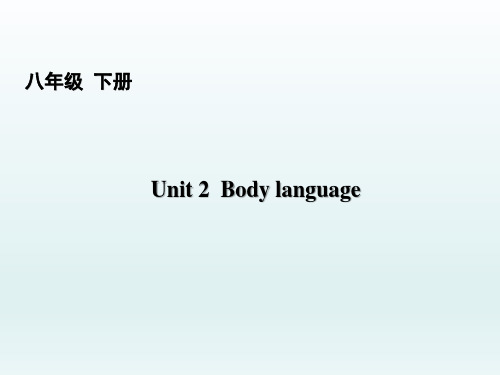
7. When we meet friends, we often __s_h_a_k_e____ hands. 8. I am ____su__re______ he will make it. 9. When we ____n_o_d____, it means we say yes. 10. He walked ___t_o_w_a_r_d_s_____ the classroom.
C. believe
( B )4. —What happened last night? —Nothing took place.
A. came
B. happened C. went
( A )5. —Where did they go at last? —They went to the park instead of going to the library.
man he wanted. He told him to ___9___ the ring for himself. “You have done so well in this little thing,” said he.“That now I know I can ___10___ you with many things.”
A. remind; of B. remind; for C. help; remind
( C )12. —Sometimes ________ language is the way you sit and stand.
—OK. I understand.
A. spoken
B. written
C. body
二、词汇测试
i. 从下面每小题的A、B、C三个选项中选出可以替换画 线部分的最佳选项。
外研版七年级英语下 Module_11__Body_language_Unit_2__Here_are_some_ways_to_welcome_them_hhh.

shake hands and smile when they meet. They usually __________
Where are they from?
Maybe
They are from America. They are American. How do they greet? They usually _______________ shake _________ kiss _______________________ hands, when they meet. or hug each other
In Greece, it’s not at all polite! In fact, it’s very rude.
wave to say goodbye be careful in fact
挥手告别 小心 事实上
语法讲解----祈使句
But be careful!
1.—Don’t be late again, Mike? —_______________. A. No, I don’t C. Sorry, I won’t B. Don’t worry D. I don’t know
Maybe
Where are they from? They are from New Zealand. They are Maori. How do they greet?
They touch noses.
You know, when we meet others, we often use our body to greet each other. Now, let learn about our body.
head
ear
深圳新版八下英语Unit-2-Body-language-(单词、词组、reading部分知识点)
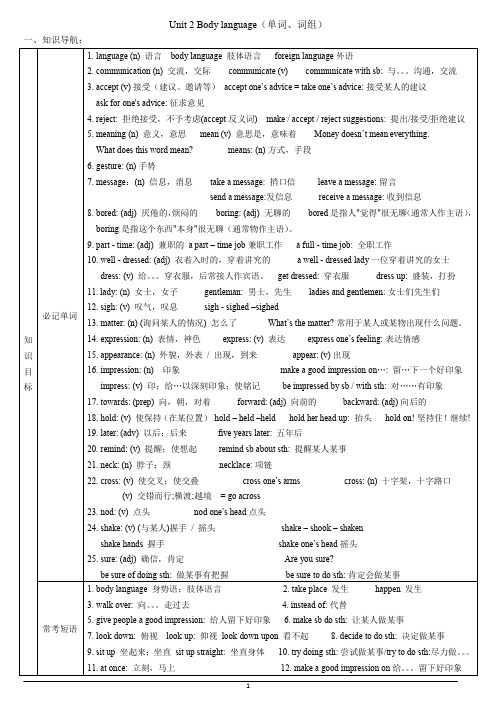
Unit 2 Body language(单词、词组)一、知识导航:二、要点全解:1. angry(生气的), excited(感到兴奋的), happy(高兴的), surprised(惊讶的) (1) angry (adj) 生气的angrily (adv)anger (n)be angry with sb: 生某人的气跟踪练习: “Why are you late for school again?” said his teacher . (angry)(2) excited (adj) 感到兴奋的,多指人对事物的感受,主语一般为人。
be excited about / at / by sth: 对。
感到兴奋e.g.: I am excited about the film. 我对这部电影感到兴奋。
【拓展】exciting (adj) 令人兴奋的,多指事物对人的影响,一般修饰物。
e.g.: Have you heard of the exciting news? 你听说那个令人兴奋的消息了吗? 【一言辩异】I was very excited after watching the exciting football match.观看了那场令人兴奋的足球比赛后,我感到非常兴奋。
(3) happy (adj) 高兴的 反义词: unhappyhappily (adv)happiness (n)(4)surprised (adj) 惊讶的多指人对某事感到惊讶,主语一般为人。
be surprised to do sth: 吃惊的做某事 be surprised at sth: 对某事感到惊讶be surprised + that 从句: 惊奇。
I am surprised to hear you say that.【拓展】① surprising: (adj) 令人惊讶的,表示某物令人惊讶。
It is a rather surprising achievement. 它真是个令人惊异的成就。
Unit 2 Pay attention to your body language课文讲解

出卖、转让本协议或者本协议中的权 利。
5. embarrass
[ɪmˈbærəs]
embarrassed [ɪmˈbærəst]
embarrassing [ɪmˈbærəsɪŋ]
v. 使尴尬 adj. 感到尴尬的 adj. 令人尴尬的
深圳专用
A matter of face Americans tend to show their emotions openly with gestures and facial expressions. If you meet an American for the first time, they usually give you a firm handshake and a broad smile.
1.pay
版权声明
感谢您下载平台上提供的PPT作品, 为了您 和熊猫 办公以 及原创 作者的 利益, 请勿复 制、传 播、销 售,否 则将承 担法律 责任! 熊猫办 公将对 作 品进行维权,按照传播下载次数进行 十倍的 索取赔 偿!
attention to 注意 1 . 在 熊 猫 办 公 出 售 的 P P T 模 板 是 免 版 税 类 ( R F : R o y a l t y - F r e e ) 正 版 受 《 中 国 人 民 共 和 国 著 作 法 》 和 《 世 界 版 权 公 约 》 的 保 护 , 作 品 的所有权、版权和著作权归熊猫办公 所有, 您下载 的是PP T模板 素材的 使用权 。 2.不得将熊猫办公的PPT模板、PPT 素材, 本身用 于再出 售,或 者出租 、出借 、转让 、分销 、发布 或者作 为礼物 供他人 使用, 不得转 授权、 出卖、转让本协议或者本协议中的权 利。
沪教牛津版八年级下Unit 2 Body language 考前必背

3. look down俯视
4. look up(在低头看某物时)抬头向上看;(在词典、参考书中或通过电脑)查阅;查检
5. sit up坐起来;坐直
6. walk away走开
7. instead of代替;而不是
8. more than多于;超过
9. make sb. do sth.使某人做某事
21. remind v.提醒;使想起
22. neck n.颈;脖子
23. cross v.使交叉;使交叠
24. nod v.点头
25. shake v.(shook,shaken)(与某人)握手v.(shook,shaken)摇头
26. sure adj.确信;肯定
重
点
短
语
1. body language身势语;肢体语言
页)交流不仅仅指说话。
3. But it’s more important for me to develop other skills at
the moment.(教材第20页)但是目前对我来说更重要的
是发展别的技能。
4. Why don’t you go skating?(教材第26页)你为什么
Module 1Social communication
Unit 2Body language
考前必背
重
点
单
词
1. languagen.语言
2. communicationn.交流;交际
3.*balletn.芭蕾舞
4. acceptv.接受(建议、邀请等)
5.*rejectv.拒绝接受;不予考虑
6. meaningn.意义;意思
牛津深圳版八年级下册Unit 2 Body language 词汇和句型讲解
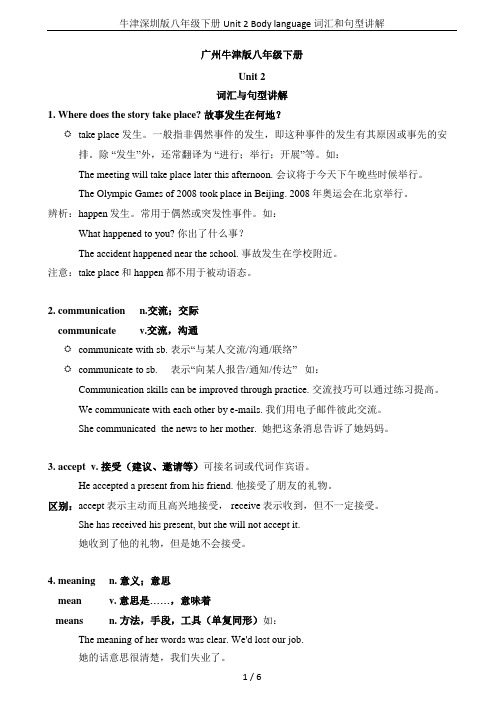
广州牛津版八年级下册Unit 2词汇与句型讲解1. Where does the story take place? 故事发生在何地?take place 发生。
一般指非偶然事件的发生,即这种事件的发生有其原因或事先的安排。
除“发生”外,还常翻译为“进行;举行;开展”等。
如:The meeting will take place later this afternoon. 会议将于今天下午晚些时候举行。
The Olympic Games of 2008 took place in Beijing. 2008年奥运会在北京举行。
辨析:happen发生。
常用于偶然或突发性事件。
如:What happened to you? 你出了什么事?The accident happened near the school. 事故发生在学校附近。
注意:take place和happen都不用于被动语态。
2. communication n.交流;交际communicate v.交流,沟通communicate with sb. 表示“与某人交流/沟通/联络”communicate to sb. 表示“向某人报告/通知/传达”如:Communication skills can be improved through practice. 交流技巧可以通过练习提高。
We communicate with each other by e-mails. 我们用电子邮件彼此交流。
She communicated the news to her mother. 她把这条消息告诉了她妈妈。
3. accept v. 接受(建议、邀请等)可接名词或代词作宾语。
He accepted a present from his friend. 他接受了朋友的礼物。
区别:accept表示主动而且高兴地接受, receive表示收到,但不一定接受。
英语八年级下unit_2《body_language》word重点内容整理
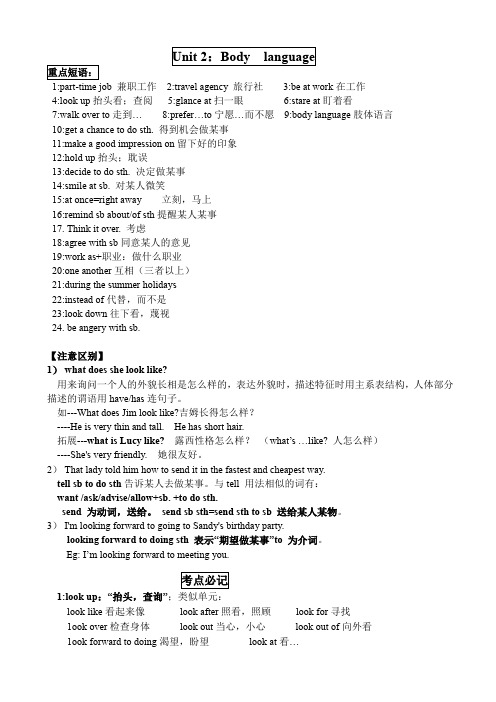
1:part-time job 兼职工作2:travel agency 旅行社3:be at work在工作4:look up抬头看;查阅5:glance at扫一眼6:stare at盯着看7:walk over to走到… 8:prefer…to宁愿…而不愿9:body language肢体语言10:get a chance to do sth. 得到机会做某事11:make a good impression on留下好的印象12:hold up抬头;耽误13:decide to do sth. 决定做某事14:smile at sb. 对某人微笑15:at once=right away 立刻,马上16:remind sb about/of sth提醒某人某事17. Think it over. 考虑18:agree with sb同意某人的意见19:work as+职业:做什么职业20:one another互相(三者以上)21:during the summer holidays22:instead of代替,而不是23:look down往下看,蔑视24. be angery with sb.【注意区别】1)what does she look like?用来询问一个人的外貌长相是怎么样的,表达外貌时,描述特征时用主系表结构,人体部分描述的谓语用have/has连句子。
如---What does Jim look like?吉姆长得怎么样?----He is very thin and tall. He has short hair.拓展---what is Lucy like? 露西性格怎么样?(what’s …like? 人怎么样)----She's very friendly. 她很友好。
2)That lady told him how to send it in the fastest and cheapest way.tell sb to do sth告诉某人去做某事。
高二下册英语第四单元知识点:Body language
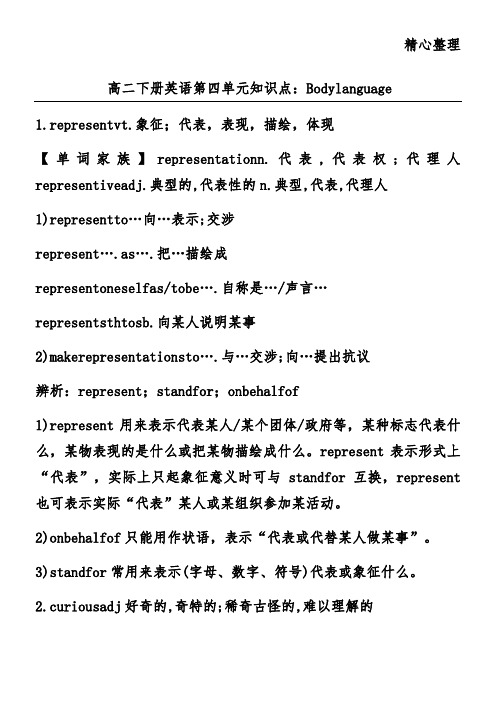
精心整理高二下册英语第四单元知识点:Bodylanguage1.representvt.象征;代表,表现,描绘,体现【单词家族】representationn.代表,代表权;代理人2)onbehalfof只能用作状语,表示“代表或代替某人做某事”。
3)standfor常用来表示(字母、数字、符号)代表或象征什么。
2.curiousadj好奇的,奇特的;稀奇古怪的,难以理解的【单词家族】curiosityn.好奇心,求知欲;奇物,珍品1)becurioustodosth极想做某事becuriousaboutstn对…感到好奇becurious+that从句…很反常着重beeagerfor“渴望”。
3)worried作“担忧”时,与anxious基本相同。
常用:beworriedabout…为…发愁/着急。
【直击高考】1.Don'tbetoo____aboutthingsyouarenotsupposedtoknow.(NMET/上海/1998)A.strangeB.amusingC.curiousD.conscious2.aboutwildplantsthattheydecidedtomakeatriptoMadagascarforf urtherresearch.(05江苏)天津)4.—attheap proachof…在…快到的时候anapproachto接近;…的方法/途径/态度approachsth./sb.靠近;接近某物/人makeanapproachetosb.接近某人anapproachtothegrammar一本语法入门的书alltheapproachestoaplace通往某地的所有途径辨析:approach;way;means;method四者都有“方式;方法;途径”之意,但approach侧重于接人待物或思的方法2)。
【】hematics.(2006湖北)A.approachesB.meansC.methodsD.ways2.Thesystemhasbeendesignedtogivestudentsquickandeasy____tot hedigitalresourcesofthelibrary.(2009浙江)A.accessB.passageC.wayD.approach3.thecitycenter,wesawastonestatueofabout10metersinheight.(1 0上海)A.ApproachingB.ApproachedC.ToapproachD.Tobeapproachedadefensesatellite防御卫星legaldefence正当防卫辨析:defend,guard,protect三者都有“保护”之意。
英语必修三Unit2 B3U2 Language points语言知识点

1.— How did your father feel when he saw
what a mess you had made?
— He can’t be _a_n_g_r_ie_r__. (angry) 2. Your story is perfect. I've never heard _____
• ②In my opinion,nothing is more pleasant than travelling.
在我看来,再没什么比旅行更愉快的 事了。
• ③—let’s go out for a walk. • – Good idea!I couldn’t agree more.
再同意不过了
①It was not until then that I suddenly realized__n_o_b_o_d_y__ was __h_a_p_p_i_e_r_ than I was.
直到那时我才突然意识到没有人比我更幸福的了。 ②__N__o_th__in_g_ in my life shook me so deeply as the
first visit to China.在我的一生中给我震撼最 大的是第一次到中国参观。
3.I have _n_e_v_e_r_ read a _m__o_r_e_i_n_te_r_e_s_t_in_g_ novel. 这是我读过的最有趣的小说。
recently, but I have been __o_n_a__d_ie_t____(节食). I was annoyed that I had let myself run to fat, so I
could _lo_s_e__w_e_i_g_h.t
沪教版初中英语八年级下册Unit 2知识点梳理

沪教版初中英语八年级下册Unit 2知识点梳理Unit 2 Body language【词汇精讲】1. acceptaccept是动词,意为“接受,收受”。
例如:She accepted his flowers happily. 她高兴地接受了他的花。
【拓展】receive和accept的辨析:(1)receive和accept都有“接收”的意思。
receive表示客观上收到,而accept表示主观上接受。
I received his invitation but did not accept it. 我收到了他的请帖,但并没有接受他的邀请。
(2)receive通常指被动地“收到”或“接到”,而accept则指主动地“接受”。
We haven't received his letter for a long time. 我们很久没有收到他的来信了。
She offered him a lift and he accepted (it). 她请他坐她的车,他接受了。
(3)表示“接见、接待”时,要用receive而不用accept。
She was warmly received.她受到热情接待。
2. messagemessage 意为“消息,信息”。
take a message 意为“捎个口信”;leave a message 意为“留个口信”;send a message 意为“发送信息”。
例如:Can I take a message for him? 我能给他捎个口信吗?He sent a message to me yesterday. 他昨天给我发了一条信息。
【拓展】辨析information, news与messageinformation 表示通过打听、观察及学习获得的资料。
news是不可数名词,意为“消息,新闻”,指通过广播、电视及报纸报道的事。
message是可数名词,意为“口信,消息”,指通过口头或笔头传递给他人的消息。
人教版高中英语必修四-第四单元-Body-language-知识点讲解

4. They had a large__m__a_jo_r_i_ty_ (major) over the other party at the last election.
4. 名词作宾语。
5. All our officers are trained
_t_o__d_e_fe_n_d_ (defensive) ourselves against knife attack. 5. 不定式表示目的。
3. __sp_e_a_k____ v.谈话,讲话 _s_p_e_e_c_h___ n. 发言 __sp__o_k_e_n__ adj.口语的
4. _d__ef_e_n_c_e___ n.防御,保卫 _d_e_f_e_n_d____ v. 防御,保卫 _d__ef_e_n_s_iv_e____ adj. 防御的,保卫的
6) A
3.The first person to arrive was Tony Garcia from Colombia, closely followed by Julia Smith from Britain. (Page 26) 第一个到达的是从哥伦比亚来的托尼·加西亚,紧随其 后的是英国的朱莉娅·史密斯。
They will be meeting at a major hotel 2
_w__it_h_ local business people and people 3_w__h_o_ represent the Chinese government. Four people enter looking around 4 _in_ a curious way. You do not want to disappoint your boss,and this is an 5_e_x_c_i_ti_n_g_ (excite) experience for you,So you stand watching and 6_l_is_t_e_n_in_g__ (listen).
英语八年级下册牛津版Unit 2 Body language
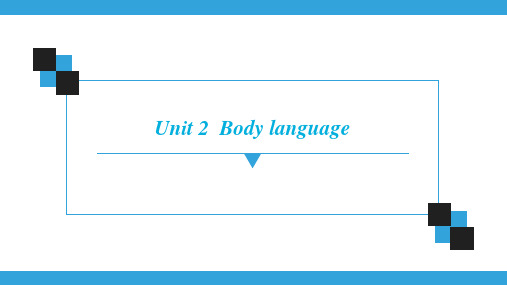
11
11
3.你没有给人们留下好的印象。(give sb. a good impression/make a good impression on sb.)
YYoouu ddoonn’’tt ggiivvee ppeeooppllee aa ggoooodd iimmpprreessssiioonn.. //YYoouu ddoonn’’tt mmaakkee aa ggoooodd iimmpprreessssiioonn oonn ppeeooppllee..
2
6.信息;消息 n. mmeessssaaggee 7.厌倦的 adj. bboorreedd 8.兼职的 adj. ppaarrtt--ttimimee 9.衣着入时的 adj. wweellll--ddrreesssseedd 10.女士;女子 n. llaaddyy
3
3
11.叹气 v. ssigighh 12.(询问某人情况)怎么了 n. mmatteer 13.表情;神色 n. eexxpprreessssiioonn 14.外貌;外表 n. aappppeeaarraannccee 15.印象 n. imimpprreessssioionn
(n.)
15
15
Unit 2 Body language
1
1
一、默写单词。
1.语言 n. llaanngguuaaggee 2.交流;交际 n. communication 3.接受 v. aacccceepptt 4.意义;意思 n. mmeeaanniinngg 5.手势 n. ggeessttuurree
2
9
9
16.一会儿后 a few moments later 17.决定做某事 decide to do sth. 18.感觉受欢迎 ffeeeellwweellccoommee 19.高兴地向某人打招呼 ggiivveessbb..aacchheeeerrffuullggrreeeettiinngg 20.对某人笑 ssmmiilleeaattssbb..
新世纪泛读教程3Unit 2

2This pattern is gradually reduced as the child matures. In teenage girls it may still be detected in the giggling cover-up of the face, with hands or papers, when embarrassed. But by the time we are adult, the childhood hiding, which decreased to adolescent shyness, is expected to disappear altogether, as we bravely stride out to meet our guests, hosts, companions, relatives, colleagues, customers, clients, or friends. Each social occasion involves us, once again, in encounters similar to the ones which made us hide as scared infants and, as then each encounter is slightly threatening. In other words, the fears are still there, but their expression is blocked. Our adult roles demand control and suppression of any primitive urge to withdraw and hide ourselves away. The more formal the occasion and the more dominant or unfamiliar our social companions, the more worrying the moment of encounter becomes. Watching people under these conditions, it is possible to observe the many small ways in which they continue to "hide" behind their mother's skirts. The actions are still there, but they are transformed into less obvious movements and postures. It is these that are the Barrier Signals of adult life.
-初二下-unit2-body-language-语法复习
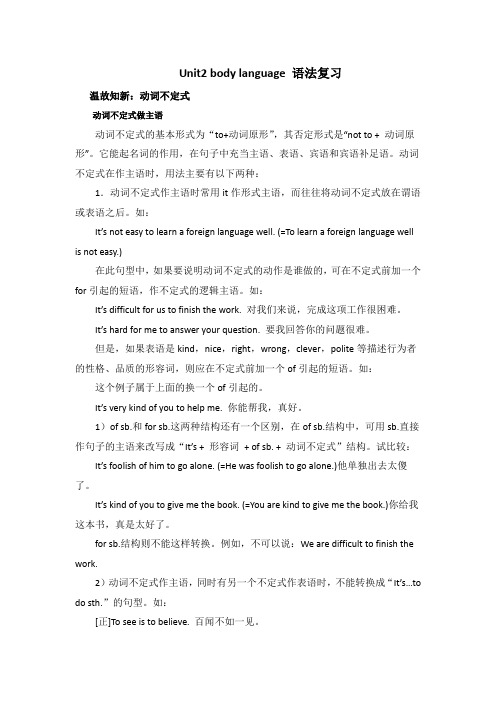
Unit2 body language 语法复习温故知新:动词不定式动词不定式做主语动词不定式的基本形式为“to+动词原形”,其否定形式是“not to + 动词原形”。
它能起名词的作用,在句子中充当主语、表语、宾语和宾语补足语。
动词不定式在作主语时,用法主要有以下两种:1.动词不定式作主语时常用it作形式主语,而往往将动词不定式放在谓语或表语之后。
如:It’s not easy to learn a foreign language well. (=To learn a foreign language well is not easy.)在此句型中,如果要说明动词不定式的动作是谁做的,可在不定式前加一个for引起的短语,作不定式的逻辑主语。
如:It’s difficult for us to finish the work. 对我们来说,完成这项工作很困难。
It’s hard for me to answer your question. 要我回答你的问题很难。
但是,如果表语是kind,nice,right,wrong,clever,polite等描述行为者的性格、品质的形容词,则应在不定式前加一个of引起的短语。
如:这个例子属于上面的换一个of引起的。
It’s very kind of you to help me. 你能帮我,真好。
1)of sb.和for sb.这两种结构还有一个区别,在of sb.结构中,可用sb.直接作句子的主语来改写成“It’s + 形容词+ of sb. + 动词不定式”结构。
试比较:It’s foolish of him to go alone. (=He was foolish to go alone.)他单独出去太傻了。
It’s k ind of you to give me the book. (=You are kind to give me the book.)你给我这本书,真是太好了。
新人教高中英语选修一nit 4 body language 知识点归纳(单词+短语+句型+语法)

英语选择性必修一Unit 4 body language 知识点归纳Language Points(单词+短语+句型+语法)一、核心短语归纳1.interaction with sb. 与某人互动2.vary from. . . to. . . 在……到……之间变化3.be appropriate to对……适合4.by contrast相比之下5.look into往……里面看6.approve of赞同7.interpret. . . as把……理解为8.by comparison(与……)相比较9.make inferences推理;推断10.get through通过;度过11.break down消除;分解;打破12.straighten up直起来;整理;收拾整齐二、经典句式1.the way 作先行词的定语从句,the way 在从句中作状语Words are important,but the way people stand,hold their arms,and move their hands can also give us information about their feelings.言语固然重要,但人们站立、握臂以及摆手的方式也会向我们传达他们的感受。
2.动名词作主语的简单句In many countries,shaking one’s head means “no”,and nodding means “yes”.在很多国家,摇头表示“否”,点头表示“是”。
3.形容词的比较级的否定形式表达最高级的含义And if we are feeling down or lonely,there is nothing better than seeing the smiling face of a good friend.如果你感到沮丧或孤独,最好的事情就是看到好朋友的一张笑脸。
外研版七年级英语下册:Module-11-Body-language--Unit-2省公开课获奖课件

3. not at all 使用方法小结:
1、用于回答感谢,意为“不用谢;不客气”。如: A: Thanks for helping me.谢谢你帮助我。 B:Not at all. I enjoyed it.别客气,很快乐能帮你。 A:Thank you very much.非常感谢你。 B:Not at all. It was the least I could do.
一、选择题。
1. Our friends like walking arm __ arm
in the street.
A. by
B. in
C. for
2. He often ____ my hand, talking about
funny stories.
A. moves B. holds C. waves
1. foot 旳复数是 feet。 2. Chinese girls often walk arm in arm
with their friends. arm in arm 表达“臂挽臂地”。
3. So you can’t move away. 所以你不能走开。 move away 表达“挪开,走开”。
1. Is body language the same in different countries? No, it isn’t.
2. Is it all right to stand close to people in the Middle East? Yes, it is.
3. Do the British like touching people? No, they don’t.
smile surprise
cry
- 1、下载文档前请自行甄别文档内容的完整性,平台不提供额外的编辑、内容补充、找答案等附加服务。
- 2、"仅部分预览"的文档,不可在线预览部分如存在完整性等问题,可反馈申请退款(可完整预览的文档不适用该条件!)。
- 3、如文档侵犯您的权益,请联系客服反馈,我们会尽快为您处理(人工客服工作时间:9:00-18:30)。
Unit 2 Body LanguageReading1.what’s wrong with sb.? 某人怎么了?2.talk to=talk with3.take place =happen 发生4.肢体语言:look up抬头看(查阅…) look down低头sit up straight 坐直look happy/bored/friendly, smile 更多:steps, gestures and expressions on their faces. 步伐,姿态和脸上的神情Cross one’s arm交叉手臂于胸前shake hands握手shake one’s head摇头nodding one’s head点头Eye contact眼神交流5.they are both students = both of them are students both放be动词后They both have part-time jobs. both 放实义动词前we both go to school in school uniform(校服)6.a well-dressed lady穿着考究的女士(整洁的)7.walk over to 走向…come over走过来walk over走过去8.give sb. a cheerful greeting 给某人一个欢快的问候9.sigh叹息10.walk away走开了11.what is the matter?发生了什么事= what is wrong with you?12.instead of 而不是I went to see a film instead of staying at home.13.it is the way you communicate. 它是你交流的方式(出了问题)14.get a chance to do= have a chance to do. Jim got a chance to talk to Mr Lu.municating is more than just speaking. more than 不仅仅是We are more than teaching you knowledge. 我们不仅仅是传授知识.The cook is more than cooking meal. 那个厨师不单单是在做饭.(比如:还蕴含一些为人处世的道理)16.on your face.17.your whole appearance你整个的外观,外貌,形象Pop stars usually have good appearance.(外貌)18.give sb. a good impression = leave a good impression on sb._________________________19.turn your head towards me. 转你的头向着我。
20.hold one’s head up. 保持头颅高昂21.feel welcome 受欢迎的22.go to sb. for help23.decide to do = be determined to do 决定去做24.try to do 尽力去做try doing尝试去做25.smile at 朝某人微笑shout at朝某人喊叫26.a few moments later 一会儿之后two days later. Three hours later. One year later 时间+ later27. remind sb. that 提醒某人某事Jim reminded Lulu that he would not come back yesterday night.remind sb. about he reminded me about the competition.28.full time job 全职工作part time job兼职工作29.think over 仔细考虑think about考虑I am thinking about going to listen to a speech today.30.dance—dancer舞者sing—singer歌手31. this type of music 这种音乐= this kind of music = this sort of music----------------------------------------------------------------------------------------------------------------------------------------------Grammer动名词是以V-ing结尾的一类名词。
动名词是不可数的,前面不能+a/an1.动名词做主语Reading is my hobby. Dancing is her favourite hobby.Swimming with friends makes me excited.Smiling shows that you are happy动名词做主语, 谓语动词用单数形式2.动名词做宾语Lily is interested in drawingI am fond of playing basketball = I love playing basketball = I like playing basketball = I enjoy playing basketball.有些动词后面必须+动名词:Mind/ finish/ love/ like/ practice/ imagine/complete/ 所有介词…John has finish doing housework.I am looking forward to your next coming.Do you mind his opening the door.(1)动词+doing:enjoy doing/ suggest doing/ keep doing/ avoid doing/ admit doing/ mean doing(2)介词+doing:prefer doing to doing/ be used to doing/ look forward to doing/ keep on doing/ succeed in doing/ insist on doing(3)惯用法:be busy doing. be worth doing. It is no use/good doing(good在这里是名词:好处,利益)spend….(in)doing. have difficulty (in) doing have trouble (in) doing have no difficulty/ trouble doing(4)既加to do 又加doingtry to do/ try doing remember to do/ doing forget to do/doing stop to do/ doing.-------------------------------------------------------------------------------------------------------------------------------------------Speaking1.make suggestions 提建议accept suggestions接受建议reject suggestions 拒绝建议2.why not…=why don’t you… =what about…=how about…3.you’d better do…= you had better do you’d better not do.. He had better not smoke at any where.4.That’s a good idea! 好主意Sound great!5. swimming is fun, but I am tired today.6. I don’t feel like it.我不想要…7.Jim keep getting low marks(低分数), so he want to improve.8.birthday present = birthday gift9.you are welcome.别客气当别人说thank you时可以使用.----------------------------------------------------------------------------------------------------------------------------------------------- More practice1.The passage is on a topic of teenagers. 关于2.speak to your friend clearly 清晰地,清楚地3.stat with a greeting 以一个问候开始end with a friendly smile 以一个友好的微笑结束John left with a pen in his hand 约翰手拿一根笔离开了4.article 文章passage(文章的)一段5.look into one’s eye 凝视they are looking into the problem调查They stopped to look into the window. 朝…里看6.the key to communication 交流的关键Do you have the key to the door.钥匙The key to the answer 答案7.friend—friendly(友好的)—friendliness(n.友好)8.interest兴趣—interested感兴趣的—interesting令人感兴趣的(物体)9.understand(v.理解)—understanding(n.理解)I fail to understand him.Eye contact can show friendliness, interest and understanding.Understanding is one of the most important things for communication.ing eye contact is important too.11.He looks away from me 他没有看我please don’t look away when someone is talking with you.12.tell a lie说谎话live a lie 过着骗人的生活lie 躺lie—lay—lain lying he is lying他正在躺着lie 说谎lie—lied—lied lying Don’t lie to me he is lying 他正在撒谎lay 安放,放置,位于lie—laid—laid laying Japan lies to the east of China.日本位于中国的东面13. differ与…不同--different--difference(s) be different from China differs from Japan in many ways—Asian 亚洲的America—美洲的Europe—European欧洲的Africa—African 非洲的Arctic 北极的the Arctic Pole北极the South Pole南极Oceanian大洋洲的Oceania大洋洲15.the Westerner西方人west—western西方的—westerner西方人16.be interested in17.cause problem 造成问题18.either/ too/ also19.Especially 尤其是I don’t like fruit, especially lemon.Special 特殊的You are special in your mother’s eye.Specially 专门是I come to China specially for you.我来中国是为了你我不喜欢运动,尤其是跑步_____________________________________马云昨天去四川是为了一个和他长得很像的被叫做“犯小勤”男孩_________________________________________ ____________________________________________________________________________________________________20.too much/ much too/ too many 但没有many to21.polite—impolite possible—impossible22. make + do原形feel nervous---- fell happy/ feel excited/ feel bored23.what do you mean?你的意思是什么?24. Asian people don’t use eye contact as often as Westerners. 和…一样频繁25.what kind of eye contact…what kind of music…what kind of clothes he want 什么样类型的..26. other people = others help others = help other people27.different ways of greeting. 不同方式的问候28.around the world全世界29.shake hands 握手kiss faces= they greet both men and women with a kiss on each cheek(脸颊).30.Instead of going to climbing mountain, they went to see a film.= Instead, they went to see a film. 独立成句31.Jim likes basketball, but I like football. = Jim likes basketball, however, I like football. 独立成句32.Brazil 巴西Brazilian 巴西人巴西的。
